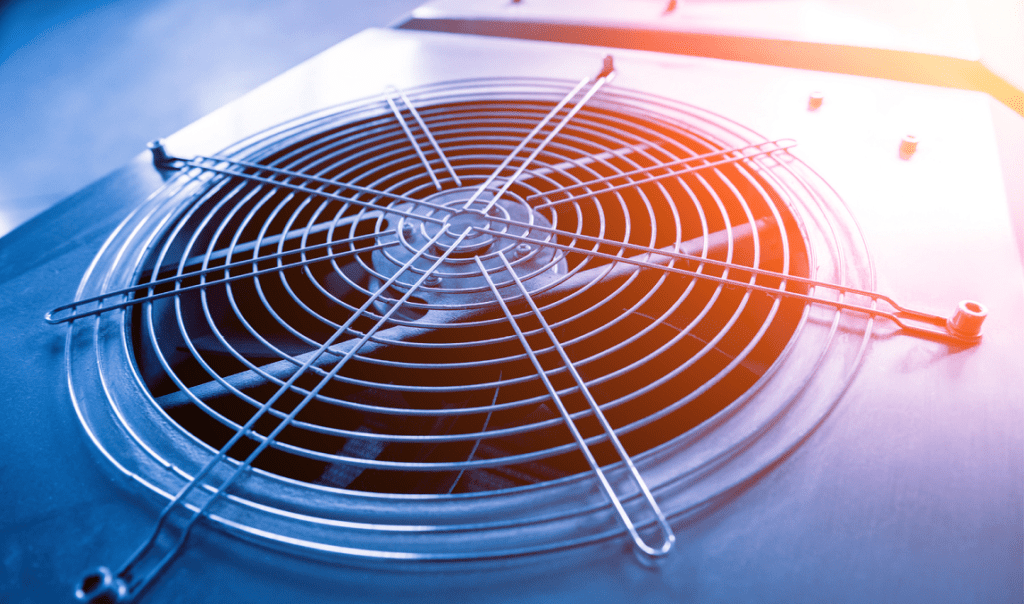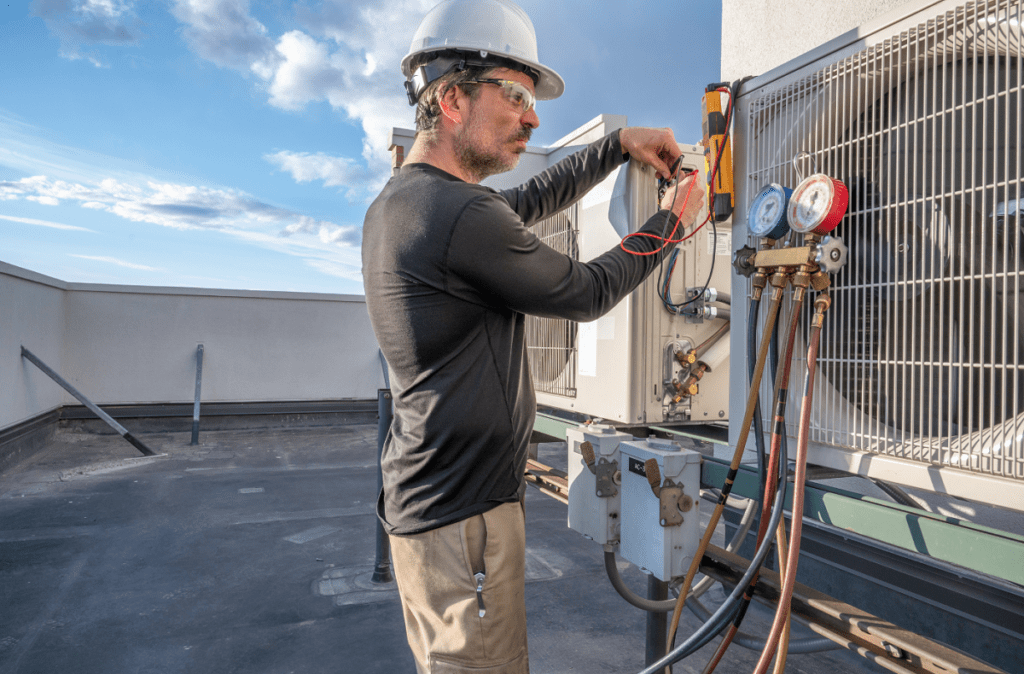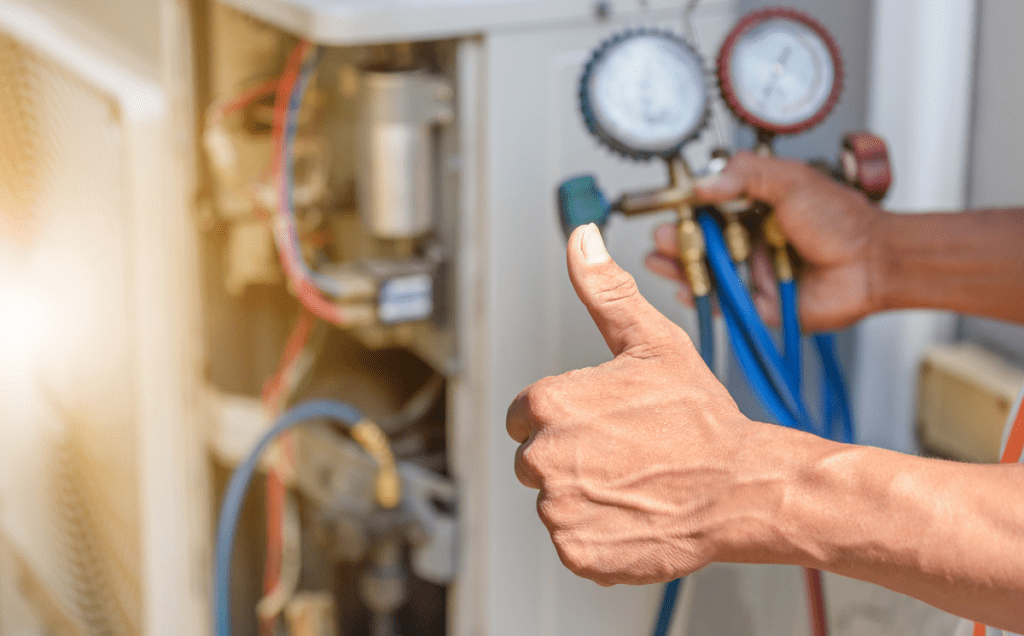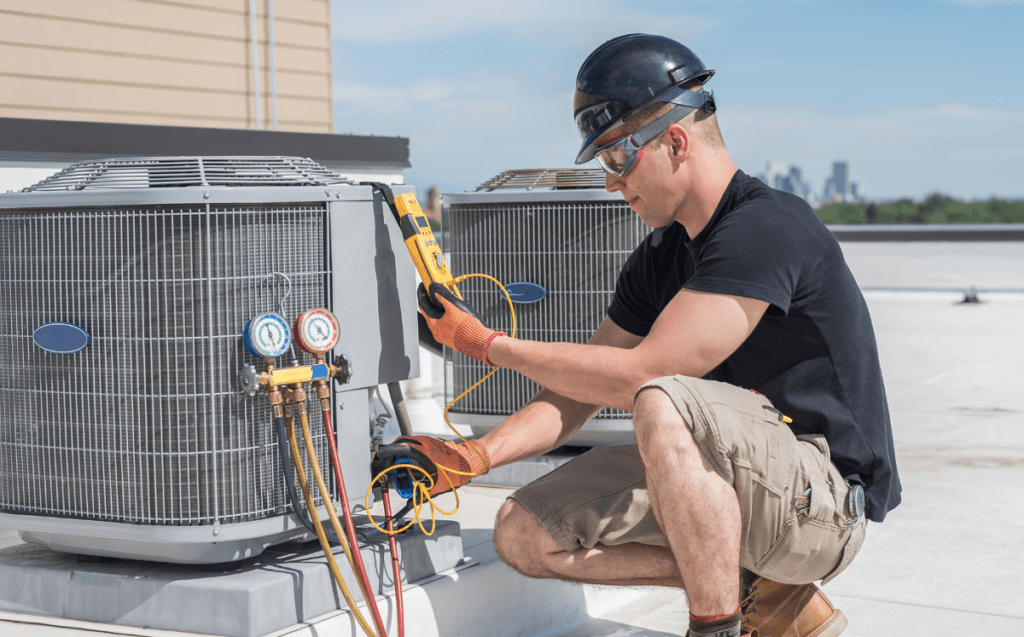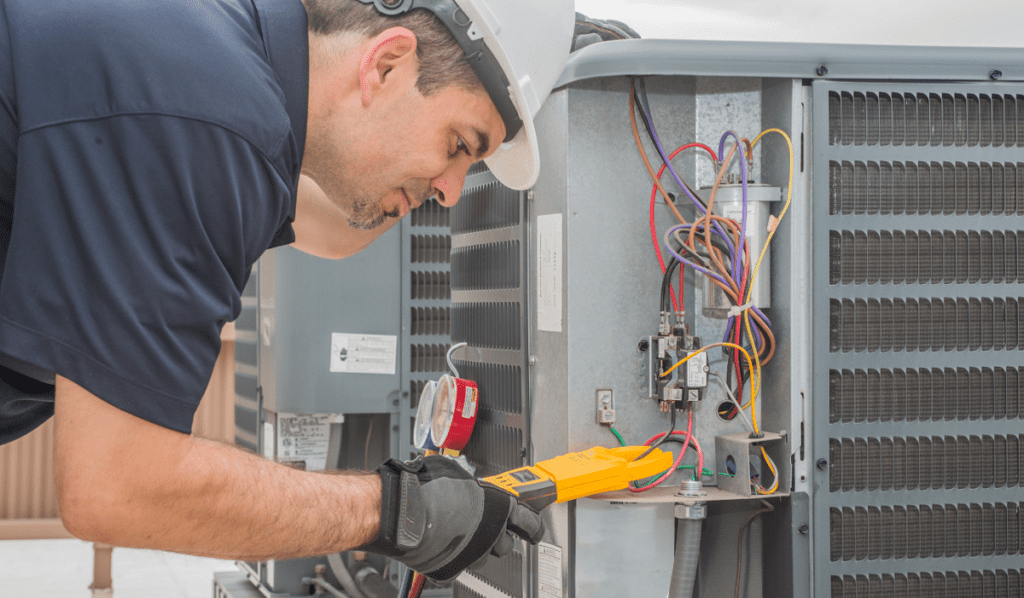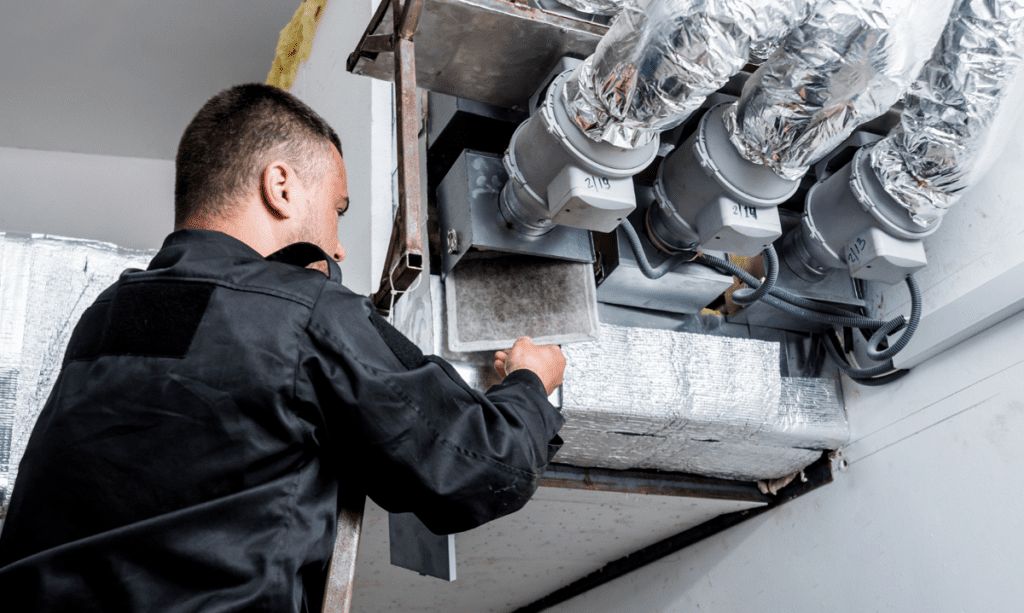If you’re dealing with an air handler leaking water on the floor, it’s important to address the issue promptly to prevent further damage and potential compressor failure. There are several possible causes for this problem, including a frozen evaporator coil, dirty air filter, damaged coil insulation, detached drain line, clogged drain line, broken drain pan, malfunctioning condensate pump, or low refrigerant levels. It’s crucial to identify the specific cause of the leak in order to implement the appropriate solution.
Key Takeaways:
- Addressing air handler leaks promptly is crucial to prevent further damage.
- Possible causes of water leaks include frozen evaporator coils, dirty air filters, and detached drain lines.
- Regular maintenance and professional assistance can help prevent leaks and ensure proper functioning of your HVAC system.
- Seek the help of licensed HVAC technicians when dealing with complex issues.
- Regularly checking and replacing the air filter can prevent water leaks caused by airflow obstruction.
Frozen Evaporator Coil
One possible cause of an air handler leaking water on the floor is a frozen evaporator coil. The evaporator coil, located inside the indoor air handler, can become covered in ice, causing the ice to melt and result in the leak. This can be caused by a blocked air filter or other more serious issues. If you notice a frozen evaporator coil, it’s important to shut off the unit and seek the assistance of a licensed HVAC technician to diagnose and resolve the problem.
Possible Causes and Solutions for Frozen Evaporator Coil:
Table: Frozen Evaporator Coil Causes and Solutions
| Causes | Solutions |
|---|---|
| Blocked air filter | Replace or clean the air filter |
| Low refrigerant levels | Contact an HVAC technician to measure refrigerant levels, identify leaks, and top up refrigerant if necessary |
| Faulty thermostat | Have a professional inspect and repair or replace the thermostat |
| Fan motor malfunction | Call a licensed HVAC technician to inspect and repair or replace the fan motor |
By addressing the specific cause of the frozen evaporator coil, you can prevent further water leakage and potential damage to your air handler and surrounding areas. It’s important to prioritize the safety and functionality of your HVAC system by seeking the expertise of a qualified professional.
Dirty Air Filter
A dirty air filter can cause trouble in your HVAC system, including an air handler leaking water on the floor. When the air filter is dirty, it obstructs air circulation, resulting in low airflow to the evaporator coils. This can cause the coils to get too cold and freeze, leading to water leakage. Checking and replacing the air filter regularly can help prevent this issue and resolve the water leak problem.
Why is a dirty air filter a problem?
A dirty air filter restricts the flow of air through your HVAC system, reducing its efficiency and potentially causing damage. As dust and debris accumulate on the filter, it becomes harder for air to pass through. This can lead to various issues, including a frozen evaporator coil.
“A dirty air filter can restrict airflow to the evaporator coil, causing it to get colder than usual and potentially freeze. When the ice melts, it can result in water leaking from the air handler onto the floor.” – HVAC expert
Regularly checking and replacing your air filter is a simple and effective way to maintain the efficiency of your HVAC system and prevent water leaks. Most air filters should be replaced every 1-3 months or as recommended by the manufacturer. However, if you have pets or live in a particularly dusty environment, more frequent filter changes may be necessary.
By keeping a clean air filter, you not only prevent water leaks but also improve indoor air quality and extend the lifespan of your HVAC system. It’s a small maintenance task that can make a big difference in the performance and longevity of your air handler.
Damaged Coil Insulation
If you have noticed water dripping from your HVAC system’s coil, the culprit could be damaged coil insulation. Over time, the insulation surrounding the evaporator coil can wear out and develop holes, causing water to drip instead of flowing through the proper drainage path. This issue can lead to an air handler leaking water on the floor, potentially causing further damage if left untreated.
Damaged coil insulation requires professional attention to address the problem effectively. A licensed HVAC technician can inspect the insulation, identify the extent of the damage, and recommend the necessary repairs or replacement. It is crucial to have this issue resolved promptly to prevent ongoing water leakage and to maintain the overall efficiency and performance of your HVAC system.
“Damaged coil insulation can contribute to an air handler leaking water on the floor, which, if left unattended, can result in more significant damage to your home.”
Seeking professional assistance for damaged coil insulation ensures that the repair or replacement is done correctly, preventing future water leakage and maintaining the integrity of your HVAC system. Remember, attempting to fix this issue without the necessary expertise can lead to further damage or even safety hazards. It is always best to rely on trained professionals who have the knowledge and experience to handle these types of repairs.
Signs of Damaged Coil Insulation
To determine if damaged coil insulation is causing your air handler to leak water, there are a few signs to look out for:
- Water dripping from the coil
- Visible holes or cracks in the insulation around the evaporator coil
- Signs of water damage or mold growth near the air handler
- Inconsistent cooling or heating performance
If you notice any of these signs, it is essential to schedule an inspection with a qualified HVAC technician. They can assess the condition of the coil insulation and recommend the appropriate course of action to resolve the water leakage issue.
| Common Causes of Damaged Coil Insulation | Potential Solutions |
|---|---|
| Normal wear and tear over time | Replace damaged insulation with new insulation |
| Physical damage due to mishandling or improper installation | Repair or replace damaged insulation |
| Excessive moisture or condensation | Address underlying moisture issues and repair or replace damaged insulation |
| Pest infestations or nesting | Remove pests, clean affected areas, and repair or replace damaged insulation |
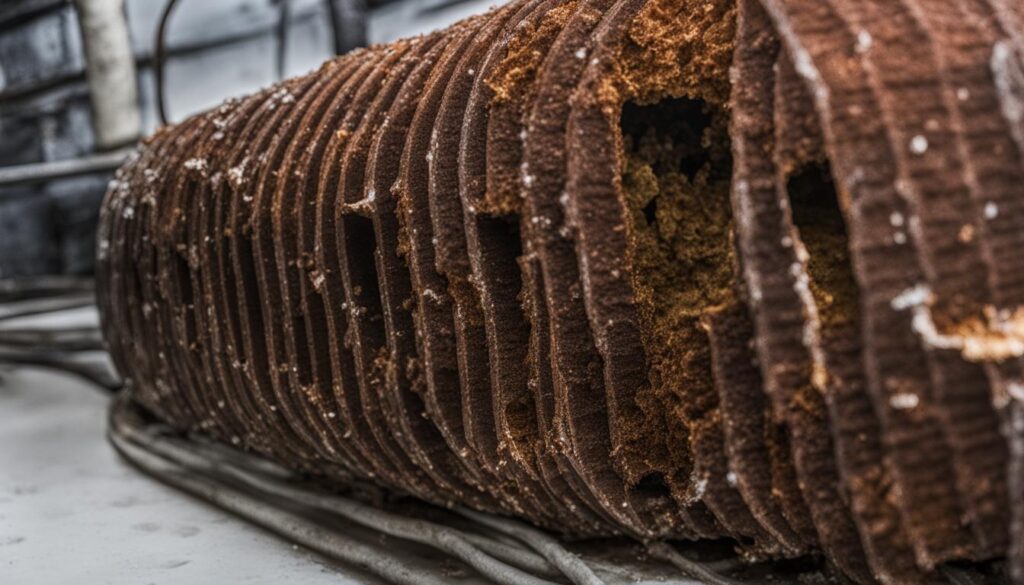
Detached Drain Line
One potential cause of an air handler leaking water on the floor is a detached drain line. Improper installation or poor connection of the drain line can cause it to detach over time, resulting in water leakage. If the drain line becomes disconnected, the condensate produced by the air handler cannot flow properly, leading to water accumulation and eventual leakage.
To identify if a detached drain line is the cause of the leak, visually inspect the area around the air handler for any signs of water pooling or dripping. Additionally, check for any disconnected or loose drain line connections. If you find that the drain line is detached, it’s essential to address the issue promptly to prevent further damage and ensure effective drainage.
If you have some DIY experience, you can attempt to reattach the drain line yourself. However, improper reconnection can lead to future leaks or drainage issues. It’s recommended to consult a professional HVAC technician to properly reattach the drain line and ensure that it is securely connected. They will have the expertise and tools necessary to fix the issue correctly, minimizing the risk of future leaks.
Steps to Reattach a Detached Drain Line:
- Locate the disconnected drain line.
- Clean the area around the connection point to ensure a proper seal.
- Apply a suitable adhesive or sealant to both the drain line and the connection point.
- Reattach the drain line firmly to the connection point.
- Allow sufficient time for the adhesive or sealant to cure and set.
- Test the system by running it for a while to check for any leaks.
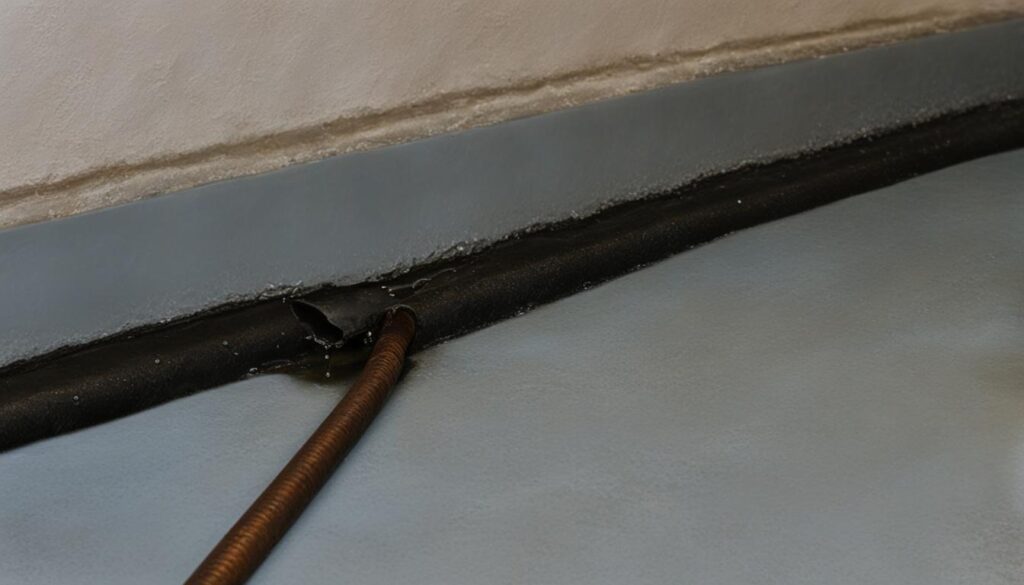
| Common Signs of a Detached Drain Line | Possible Solutions |
|---|---|
| Water pooling or dripping around the air handler | Inspect and reattach the detached drain line |
| Excessive moisture or humidity in the area near the air handler | Ensure proper reconnection of the drain line |
| Increased water accumulation in the air handler’s drain pan | Consult a professional to reattach the detached drain line |
Proper installation and regular maintenance of your HVAC system are crucial to prevent issues like a detached drain line. It’s always recommended to rely on the expertise of a licensed HVAC technician to address any problems effectively and ensure the optimal performance of your system.
Clogged Drain Line
Neglected maintenance can often lead to a clogged drain line, causing an HVAC system to leak water on the floor. Over time, dust and debris can build up in the drain line, blocking the flow of water and causing it to back up into the system. This blockage can result in water leakage from the air handler onto the floor.
Regular professional maintenance is essential to prevent clogs in the drain line and maintain the efficiency of your HVAC system. However, if you’re experiencing a clogged drain line, you can try a simple solution to resolve the issue. Mix a solution of equal parts vinegar and water, and pour it down the drain line to break down any accumulated debris. Let it sit for about 30 minutes, then flush the drain line with clean water to clear the clog. This method can often restore proper drainage and eliminate the water leak.
To ensure long-term prevention of clogged drain lines, it’s crucial to schedule regular professional maintenance. HVAC technicians can inspect and clean the drain line, ensuring that it remains clear and free from debris. Additionally, they can address any other potential issues that may be contributing to the water leak, providing comprehensive solutions for a properly functioning HVAC system.
| Signs of a Clogged Drain Line | Solution |
|---|---|
| Water leakage from the air handler | Mix a solution of equal parts vinegar and water, pour it down the drain line, let it sit for 30 minutes, then flush with clean water |
| Slow drainage or backup in the condensate pan | Schedule regular professional maintenance to inspect and clean the drain line |
| Dampness or water stains near the air handler | Ensure proper airflow and regularly replace dirty air filters |
Summary
- Neglected maintenance can lead to a clogged drain line, causing water leakage from the air handler onto the floor.
- Mixing vinegar and water can help clear a clogged drain line, but regular professional maintenance is necessary for long-term prevention.
- Signs of a clogged drain line include water leakage from the air handler, slow drainage or backup in the condensate pan, and dampness or water stains near the air handler.
Regular professional maintenance is crucial in ensuring the proper functioning of your HVAC system. By addressing a clogged drain line promptly, you can prevent water leaks and potential damage to your home. Don’t neglect the maintenance of your HVAC system to avoid the headache of dealing with water leaks in the future.
Broken Drain Pan: A Common Culprit of HVAC Leaking Water on Floor
In the world of HVAC systems, a broken drain pan can often be the source of an air handler leaking water on the floor. Over time, due to constant exposure to moisture, the drain pan can develop small holes and cracks, causing water to escape and pool around the air handler. If left unaddressed, this moisture can lead to significant damage to your flooring and surrounding areas.
To identify a broken drain pan, a visual inspection is crucial. Look for signs of rust accumulation or any visible cracks in the pan. If you notice any of these indicators, it’s essential to seek professional help to assess the extent of the damage and determine the best course of action.
Temporary solutions such as sealing the cracks with a water sealant may provide short-term relief. However, for a long-term resolution, it’s recommended to consult an expert HVAC technician. They can guide you through the process of replacing the entire drain pan if necessary, ensuring a reliable solution to prevent further water leaks.
| Signs of a Broken Drain Pan: |
|---|
| 1. Rust accumulation |
| 2. Visible cracks or holes |
| 3. Water pooling around the air handler |
Remember, a broken drain pan should be addressed promptly to prevent additional damage and avoid costly repairs. Seeking professional assistance will ensure that the issue is resolved effectively and that your HVAC system continues to operate efficiently, keeping your home comfortable and free from water-related concerns.
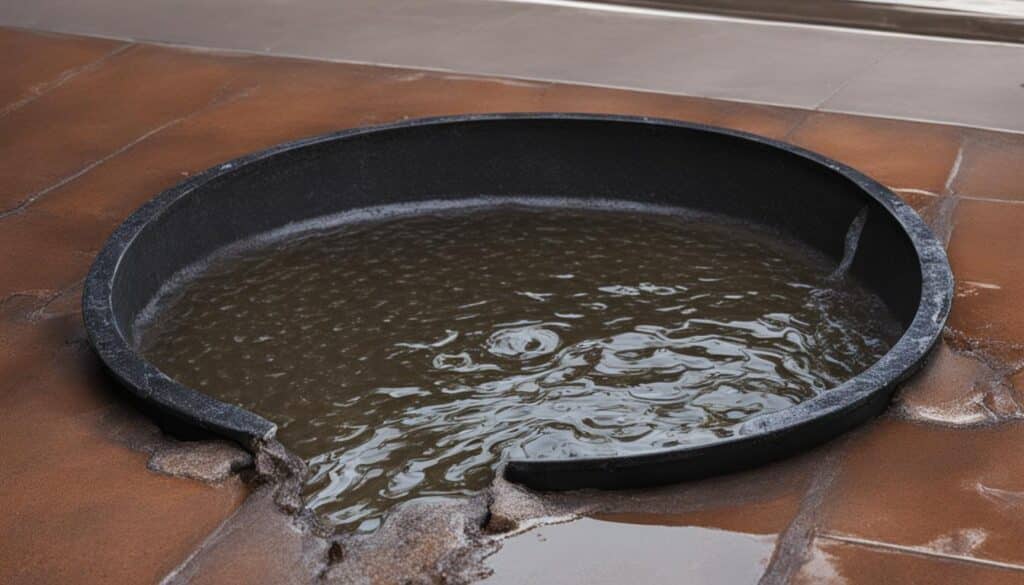
Malfunctioning Condensate Pump
One possible cause of an air handler leaking water on the floor is a malfunctioning condensate pump. The condensate pump plays a crucial role in removing water from the HVAC system and directing it away from your home. When the pump malfunctions, it fails to expel the water properly, causing it to build up and eventually leak from the unit.
Identifying a malfunctioning condensate pump can be challenging, but there are a few signs to watch out for. If you notice water pooling around the air handler, excessive moisture or humidity in the air, or unusual sounds coming from the pump, it may indicate a malfunction. In such cases, it is essential to contact a qualified HVAC technician to diagnose and address the issue.
“A malfunctioning condensate pump can lead to water buildup and HVAC leakage, potentially causing significant damage if left unattended.” – HVAC Expert
Resolving a malfunctioning condensate pump typically involves troubleshooting the pump, checking for blockages or clogs, and testing its functionality. In some cases, the pump may be repairable by replacing faulty components or restoring proper alignment. However, if the pump is beyond repair, a replacement may be necessary to ensure the efficient removal of water from the HVAC system.
To prevent future issues with the condensate pump, regular maintenance is essential. Routine inspections, cleaning, and lubrication can help keep the pump in optimal condition and prevent potential malfunctions that may lead to water leakage.
| Signs of a Malfunctioning Condensate Pump | Possible Causes |
|---|---|
| Water pooling around the air handler | Failed pump motor |
| Excessive moisture or humidity in the air | Clogged or blocked pump drain line |
| Unusual sounds coming from the pump | Broken impeller |
When dealing with an air handler leaking water on the floor, it’s crucial to consider the possibility of a malfunctioning condensate pump. By promptly addressing this issue with the help of a professional HVAC technician, you can prevent water buildup, potential damage to your home, and ensure the efficient operation of your HVAC system.
Low Refrigerant Levels: A Potential Cause of HVAC Leaking Water on Floor
Low refrigerant levels in your HVAC system can lead to a range of issues, including an air handler leaking water on the floor. When the refrigerant levels are insufficient, the evaporator coil may not be able to absorb heat effectively, resulting in the formation of ice on the coil. As this ice melts, it can drip down and cause water leakage. Monitoring energy bills for a significant increase, along with the presence of ice on the coils and a hissing sound from refrigerant lines, can indicate a problem with refrigerant levels.
To address low refrigerant levels and prevent further water leakage, it’s crucial to contact an experienced air conditioner specialist. They can accurately measure the refrigerant levels, identify any leaks in the system, and recharge the refrigerant if necessary. It’s essential to have this work done by a professional to ensure it is carried out safely and effectively.
Signs of Low Refrigerant Levels:
- Increased energy bills
- Ice formation on the coils
- Hissing sound from refrigerant lines
- Inconsistent cooling performance
- Water leakage from the air handler onto the floor
Low refrigerant levels in your HVAC system can lead to a range of issues, including an air handler leaking water on the floor.
Regular maintenance is key to preventing low refrigerant levels and other HVAC problems. Scheduling annual tune-ups with a licensed HVAC technician allows for the early detection of refrigerant leaks and any other underlying issues that may contribute to water leakage. By addressing low refrigerant levels promptly, you can ensure a reliable and efficient HVAC system, while also preventing potential damage to your home.
| Causes of Low Refrigerant Levels | Solutions |
|---|---|
| Refrigerant leaks | Identify and repair leaks, then recharge refrigerant |
| Inadequate initial refrigerant charge | Measure and adjust refrigerant levels |
| Poor installation | Inspect and correct installation issues |
Ensuring proper refrigerant levels is essential for the optimal functioning of your HVAC system, preventing water leakage, and maintaining a comfortable indoor environment. By staying vigilant and promptly addressing low refrigerant levels, you can avoid the inconvenience and potential damage caused by an air handler leaking water on the floor.
Crisis Aversion and Identification
If you’re dealing with an air handler leaking water on the floor, it’s crucial to take immediate action to prevent further damage to your home. Detecting and addressing the issue promptly can help avert potential crises and ensure the proper functioning of your HVAC system. In this section, I will discuss some crisis aversion strategies and the importance of identifying the cause of the water leak.
Preventing Further Damage
When you notice an air handler leaking water on the floor, it’s essential to act quickly to minimize the impact on your home. Start by shutting off the unit to prevent any electrical hazards or further damage to the HVAC system. Next, place towels or absorbent materials around the leak area to prevent water from spreading and causing damage to your floors or furnishings.
Contacting a professional HVAC technician is crucial at this point. They have the expertise and knowledge to diagnose the issue accurately and implement the appropriate solution. Attempting DIY repairs without proper knowledge or experience may further aggravate the problem and lead to more significant damage.
Identifying the Cause of the Water Leak
Identifying the specific cause of the water leak is vital for resolving the issue effectively. There are several possible causes, as discussed in previous sections, including a frozen evaporator coil, dirty air filter, damaged coil insulation, detached or clogged drain line, broken drain pan, malfunctioning condensate pump, or low refrigerant levels. Each of these scenarios requires a different approach for resolution.
By hiring a professional HVAC technician, you can rest assured that the cause of the water leak will be accurately identified. They have the necessary tools and knowledge to inspect the system thoroughly, pinpoint the exact cause of the leak, and provide a reliable solution. Don’t delay in contacting a professional, as addressing the issue promptly can prevent further damage and save you from potential future repairs and expenses.
Conclusion
Dealing with an air handler leaking water on the floor can be a frustrating and potentially damaging situation for homeowners. However, by understanding the potential causes and taking prompt action, you can address the issue and prevent further damage to your home.
It’s important to remember that there are several possible causes for an air handler leaking water on the floor, including a frozen evaporator coil, dirty air filter, damaged coil insulation, detached or clogged drain line, broken drain pan, malfunctioning condensate pump, or low refrigerant levels. Each of these issues requires a different approach to resolve the water leak problem effectively.
Regular maintenance of your HVAC system, such as checking and replacing the air filter, clearing the drain line, and monitoring refrigerant levels, can help prevent water leaks and ensure the proper functioning of your system. If DIY solutions are not effective, seeking the assistance of a professional HVAC technician is crucial to diagnose and resolve the issue, preventing further damage and ensuring a reliable solution.
FAQ
What can cause an air handler to leak water on the floor?
Possible causes for an air handler leaking water on the floor include a frozen evaporator coil, dirty air filter, damaged coil insulation, detached drain line, clogged drain line, broken drain pan, malfunctioning condensate pump, or low refrigerant levels.
How does a frozen evaporator coil lead to water leakage?
A frozen evaporator coil can cause water leakage when the ice melts and drips from the coil.
Can a dirty air filter cause water leak issues with the air handler?
Yes, a dirty air filter can obstruct airflow to the evaporator coil, causing the coil to get too cold and freeze, resulting in water leakage.
What is the impact of damaged coil insulation on water leakage?
Damaged coil insulation can cause water to drip from the coil instead of flowing through the proper drainage path, leading to water leakage.
How can a detached drain line contribute to an air handler leaking water on the floor?
Improper installation or poor connection of the drain line can cause it to detach over time, resulting in water leakage.
How does a clogged drain line lead to water leakage?
Neglected maintenance can result in a clogged drain line, causing water to back up into the system and leak from the air handler.
Can a broken drain pan be responsible for an air handler leaking water on the floor?
Yes, a broken drain pan can develop holes and cracks, causing water to leak from the air handler.
What role does a malfunctioning condensate pump play in water leakage?
A malfunctioning condensate pump can cause water to build up and leak from the air handler when it fails to push water out of the system.
How can low refrigerant levels contribute to water leakage?
Low refrigerant levels can lead to a frozen evaporator coil, resulting in water leakage from the air handler.
What should I do if my air handler is leaking water on the floor?
It’s important to take immediate action to diagnose and fix the cause of the water leak. If DIY solutions are not effective, it is recommended to contact a professional HVAC technician for assistance.

